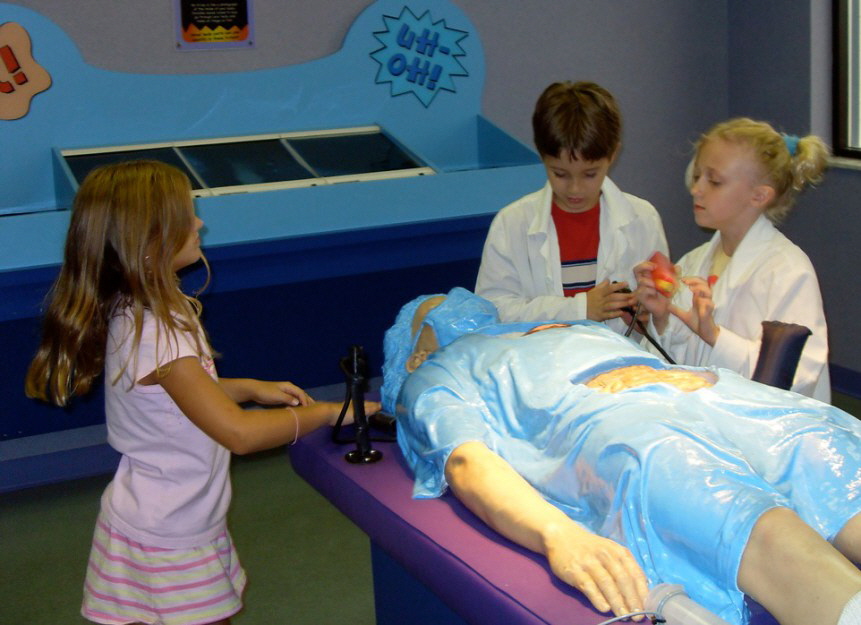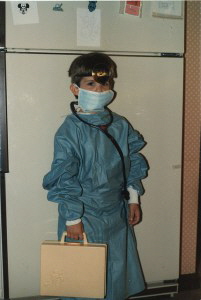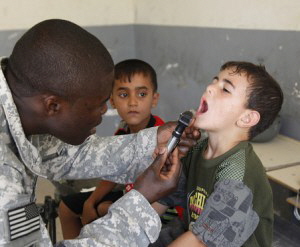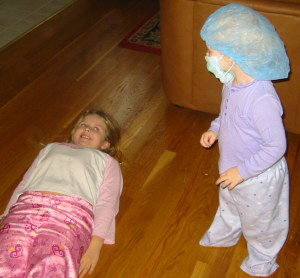|

Playing Doctor – Safe Fun for Children
October 16, 2014
Is there a Dr. in the house? If you have children between the ages of three and six the answer is, “Yes”.
Children playing doctor with animals as patients is no problem – right? (Playing Vet) With Humans it’s a different story. Never seen an anatomically correct stuffed animal. Your children and their friends have private parts. But they don’t have sexuality. They are curious because they are learning that things and people have different parts and different bodies.
For the “Playing Doctor” from a sexuality point of view see these great posts at
- Basically the advice is, “Don’t freak out. It’s natural. Be open, accurate and simple. Encourage them to come to you to discuss sex. Otherwise where will they get their information about important stuff?”
Playing doctor, like other imaginary play, allows your children to try on different hats and work through different scenarios. Possible benefits of playing doctor might be:
- having empathy
- expanding vocabulary
- using social skills
- dressing appropriately
- being prepared
- working out fears
- developing self confidence
- improving handwriting
 Empathy: Playing doctor or hospital gives lots of chance to be sympathetic to the person and the situation. There’s a sick person to diagnose, comfort and treat. There’s a concerned parent or relative that’s having an out of the ordinary day being at the doctor. The doctor has lots of patients to fix, how easy can that be? Empathy: Playing doctor or hospital gives lots of chance to be sympathetic to the person and the situation. There’s a sick person to diagnose, comfort and treat. There’s a concerned parent or relative that’s having an out of the ordinary day being at the doctor. The doctor has lots of patients to fix, how easy can that be?
Vocabulary: Doctors have to know all these special words to identify tools, situations, tests and symptoms. Hospitals have different equipment, people and places; say, “X-Ray”.
Social Skills: Doctors don’t work by themselves. There’s front office, reception, perhaps an admitting nurse. The patient of course. And maybe the finance or discharge team. Doctors have lot’s of communicating and connecting to make their practice work. Of course it’s not necessary your children duplicate the entire setup. It’s their play and their imagination.
Dressing Appropriately: Doctor get special clothes; lab coats, gloves, maybe a mask. They wash their hands – a lot. Dressing appropriately for different situations is something you do all the time.
Being Prepared: Can’t diagnose without a stethoscope, otoscope or reflex hammer? There’s only one tool for giving shots. Remember though, it’s doesn’t have to be the fanciest toys. An empty roll from paper towels makes a scope. An old toothbrush might be perfect for testing reflexes. A paper with a label is the Doctors Bag.
Reduce Fears: Maybe your child has been to the doctor recently and it wasn’t that fun. Maybe they got a booster shot or didn’t like the tongue depressor in their mouths. Playing doctor allows the child to process the visit and come to grips with what happened. Hopefully the next visit will be an annual checkup.
Self Confidence: Doctors are powerful. Mom does what they say. We all do. They have magic wands and wizard robes (otoscope and lab coat). Is it any wonder children want to pretend?
Improving Handwriting: OK this might be a stretch. Perhaps older children that have the whole scenario going will be passing orders from one to the other and if they want their notes and orders read then they will have to legible.
Playing doctor, like any role playing, allows children to use and develop their imaginations. The sexuality component adds more intrigue for adults than it does for the kids. Let them play. Supervise as required.
|